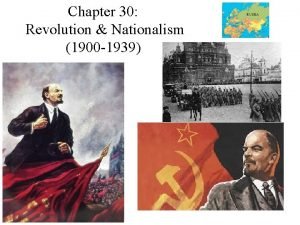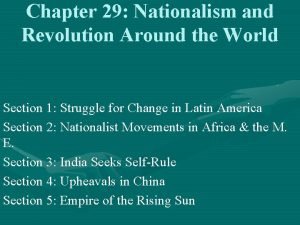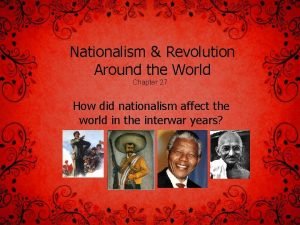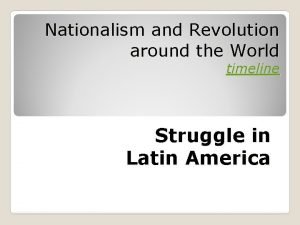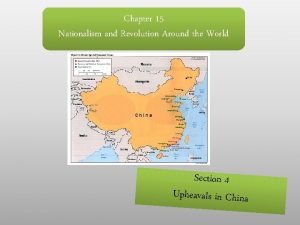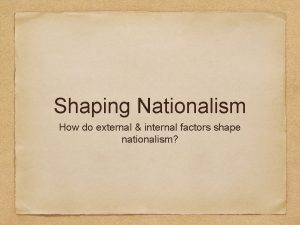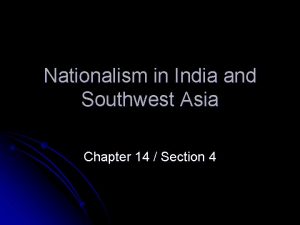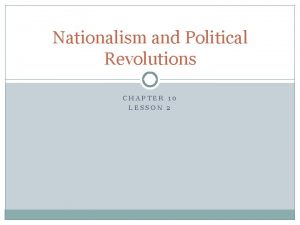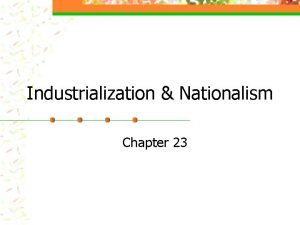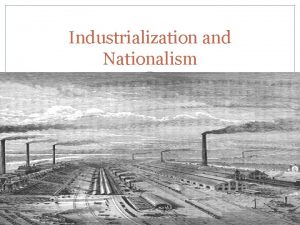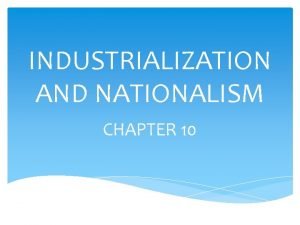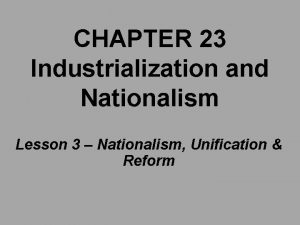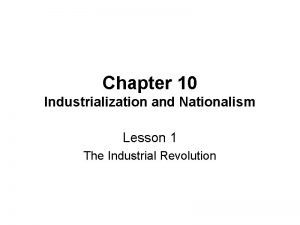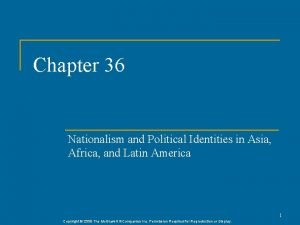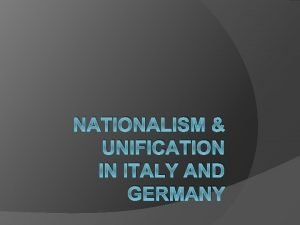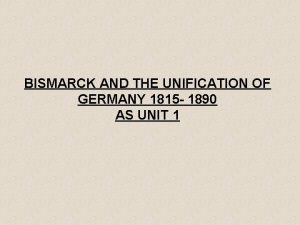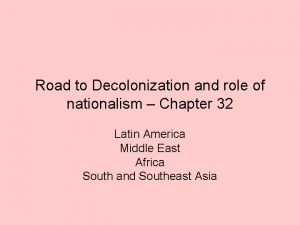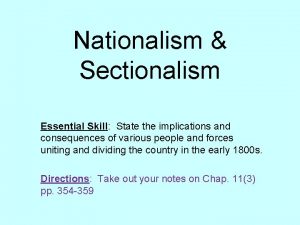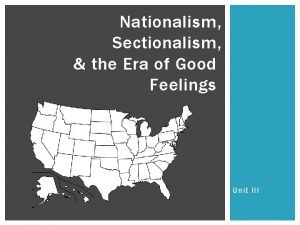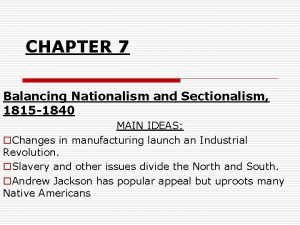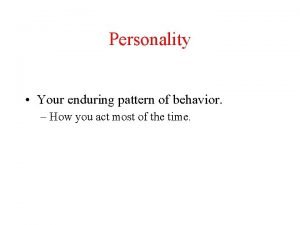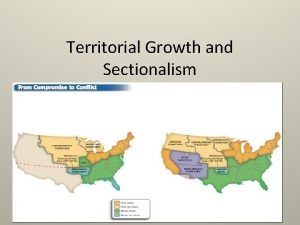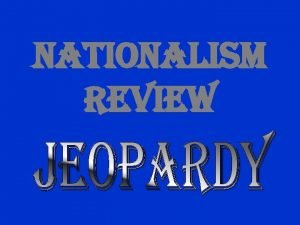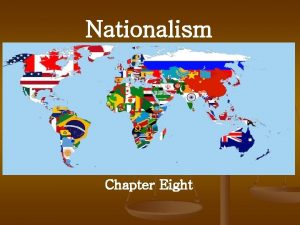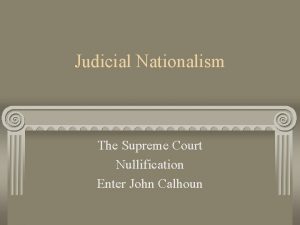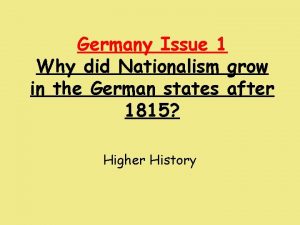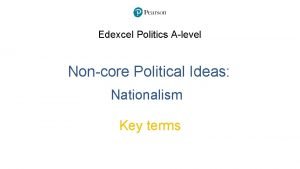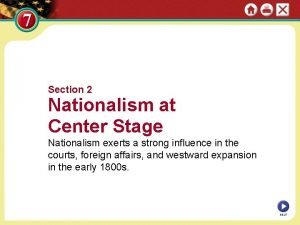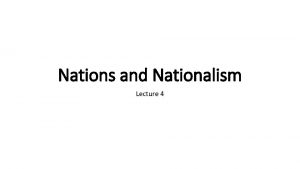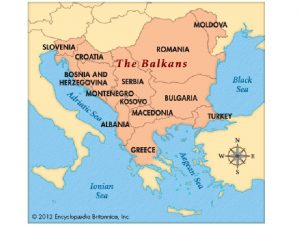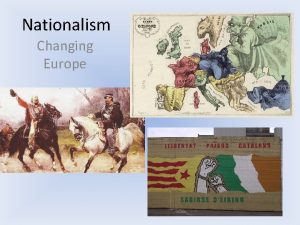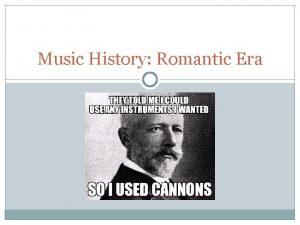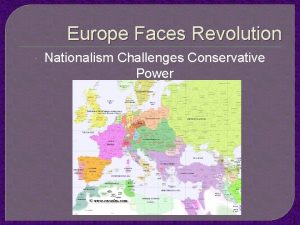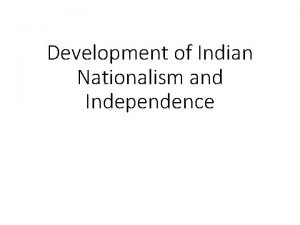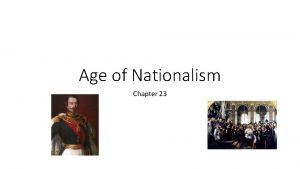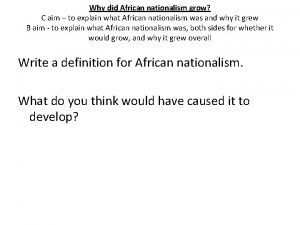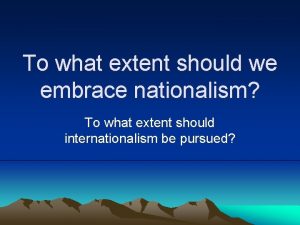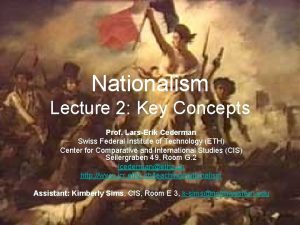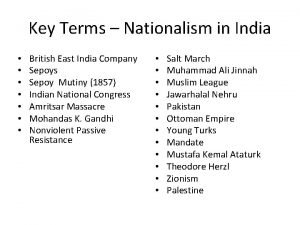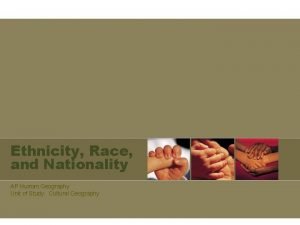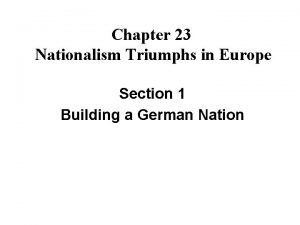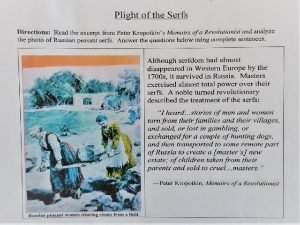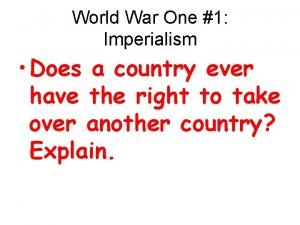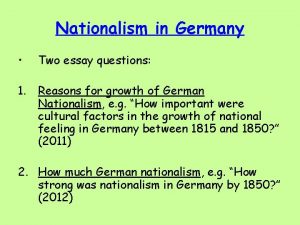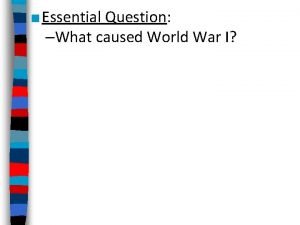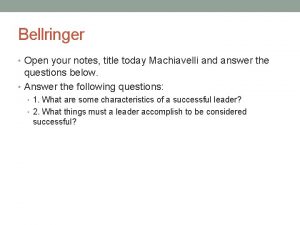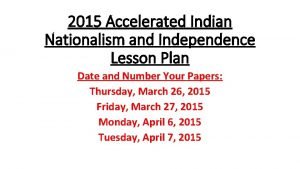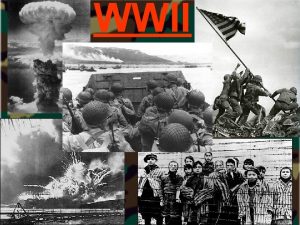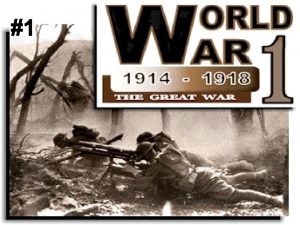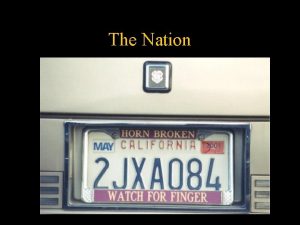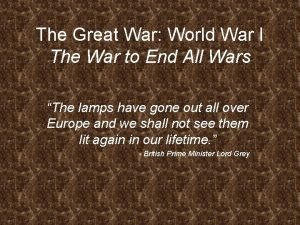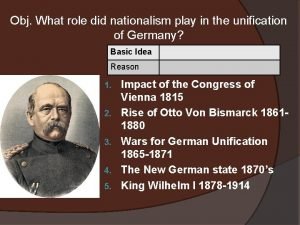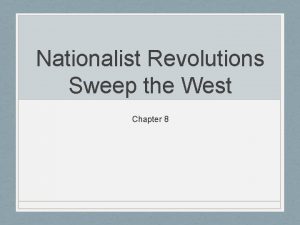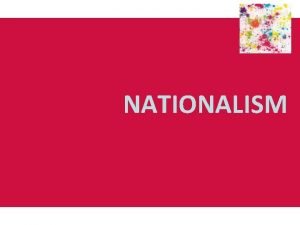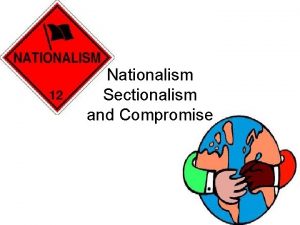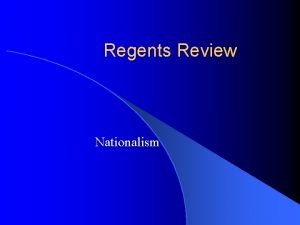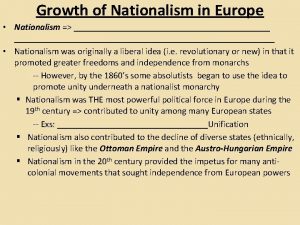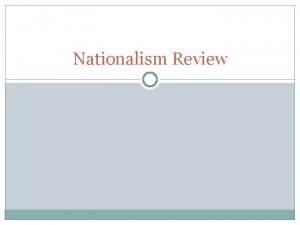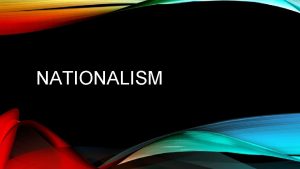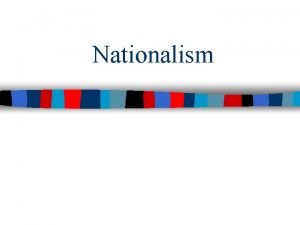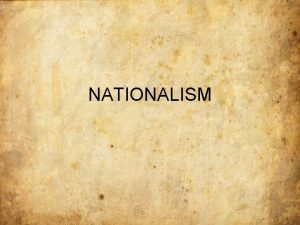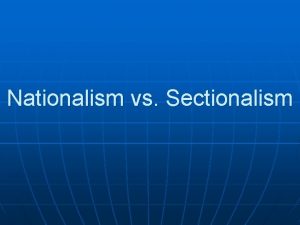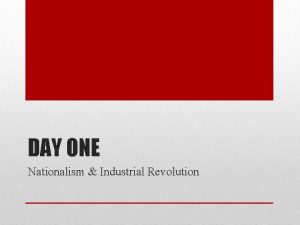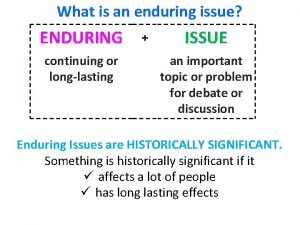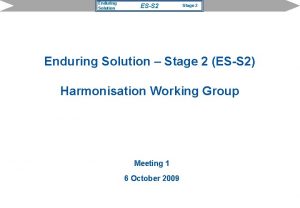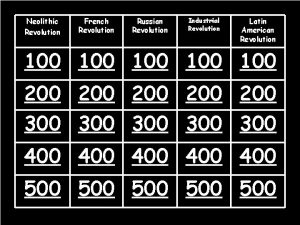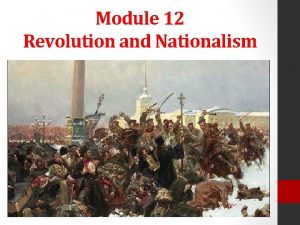Unit II Revolution and Nationalism Unit II Enduring











































































- Slides: 75

Unit II Revolution and Nationalism

Unit II Enduring Understandings �The collision of social unrest and new political ideas can lead to revolution. �The outcomes of revolutions can not always be controlled once the revolution begins. �In times of crisis, people will turn to strong leaders to gain a sense of stability. �Nationalism can act as both a unifying and a divisive force.

Unit II Essential Questions �When is a revolution justified? �Was the French Revolution a revolution of bread or ideas? �How are global revolutions affected by social, economic, and political forces? �How should resources and wealth be distributed? �Why do political revolutions occur?

The French Revolution 1789 -1799

The Old Regime

Pre-Revolutionary France �In 1700 s, France was considered the most advanced _______country in Europe. �Was the center of the Enlightenment _____. �Still divided, however, by feudal social system Old Regime called the ____.

The Three Estates of the Old Regime

The Old Regime Three Estates (social classes) The First Estate clergy �Church ______ (bishops, abbots, and priests) � 100, 000 people (Only 1% of 10 population, but owned ___% of the land). Privileged class. Paid NO �____ taxes _______and lived in luxury.

The Second Estate rich nobles �Made up of ______. privileged (Another _____class) � 400, 000 people (Only 2% of the population, but owned 20 ____% of the land). �Held all important positions in _____ and society government and lived in luxury. almost no taxes �Paid ________!

The Third Estate (97 % of France’s population) unprivileged • France’s _____ class. all France’s • Paid almost ___of taxes. Paid taxes to nobles, the king, and the Church. � Had no power to influence _______ government military service � Forced to do_____. • Resented ______ nobles and clergy for their privileges and special treatment. • Discontented and eager for _____. change

Third Estate - Three Groups Bourgeoisie �______ ØMerchants and artisans ØWell-educated. ØSome wealthy. Urban Workers �______ ØCooks, servants, others. ØPaid very low wages. ØOften went hungry. Peasants (80% of population) �_____ ØFarmers ØHomeless and poor

Causes of the French Revolution

Causes of the French Revolution 1. Unfair Class Structure First and �Members of _____ Second Estates lived _______ extravagant lifestyles. �Third Estate: taxed ØHeavily _____ ØNo _____ right poor ØMostly _____ ØRESENTFUL!

Explain the point made in this political cartoon.


Watch the following…. Mel Brook’s view of the French Revolution and the Third Estate: The Third Estate * Complete pg. 4 in the packet “Identifying Estates”.

Causes of the French Revolution 2. Enlightenment Ideas � Philosophes challenged authority and questioned why so few held so power much ______. Ø Questioned fairness of aristocracy wealth having so much ______. Ø Questioned concept of absolute monarchy / rule by _____. divine right equality, liberty, democracy � Ideas of __________ spread among the Third Estate. � Inspired by the success of the __________. American Revolution

Enlightenment Ideas People begin to question traditional beliefs French Revolution Citizens begin to question socioeconomic structure in country So, how did each of the three Estates view the ideas of the Enlightenment?

Views on the Enlightenment by the 3 Estates: �The First Estate feared Enlightenment Ideas- they did not want change. �The Second Estate also feared Enlightenment Ideas- though there were a few exceptions~ individuals who saw an opportunity for more power and control. �The Third Estate embraced the ideas of the Enlightenment.

Causes of the French Revolution 3. Economic Crisis / Food Shortages �Failing economy. �Widespread crop failures 1787 -1789 led to serious grain shortage and higher food prices. Price of bread doubled in 1789. �Farmers and peasants lost income. Many people unemployed. Many poor people faced starvation. �Population increase strained France’s resources. �France deeply in debt due to costly wars and its support of American Revolution �Government was BANKRUPT

Causes of the French Revolution 4. Louis XVI a Weak Leader �King at age 20 and unprepared to rule. Indecisive and weakwilled. Versailles �Lived in luxury at _____ and put off dealing with economic problems __________. nobles �Eventually decided _______ should start paying taxes to save the economy. Estates General • Had to convene _____ (French Parliament) in 1788 to get its approval of new taxes. Hadn’t met since 1614 (175 years).

Louis XVI’s Queen: Marie Antoinette �Married to Louis at age 15. Austrian �Was _____. Marriage arranged to create alliance Austria between France and ______. French people �Not liked by ______. male heir �Didn’t produce _____-her most important job -- for seven years. �Extravagant lifestyle. Obsessed fashion with outrageous ____. � Became known as “Madame Deficit ____. ” Why?

The Revolution Begins 1789

May, 1789 Meeting of the Estates-General

May, 1789 Meeting of the Estates-General nobility � Should _____ pay taxes to reduce economic crisis? � Medieval Voting Rules: Ø Each estate got 1 vote total Ø The 1 st and 2 nd Estates always voted the same Third Estate � _____demanded a each delegate vote for ______. (It had as many delegates than other two estates combined. So, what was the problem?

May, 1789 Meeting of the Estates-General • King sided with nobles and ordered Estates General to follow medieval voting rules. • First and Second Estates voted against the nobility having to pay taxes.

Third Estate Delegates � Represented the educated elite. 25% lawyers and 43% government officials. � Strong sense of common grievance and purpose. � Considered themselves the true representatives of the French people. * What did the Third Estate want? Read pgs. 184 -187 in the “Human Record” and answer the questions on pg. 185.

Demands of the Third Estate �Third Estate delegates declared absolute monarchy end to ________and the beginning of representative _____ government _____ �Declared themselves to be a new National Assembly ________– a new parliament that represented the people. constitution �Demanded a new _____. revolution • First deliberate act of ____!

May, 1789 The "Tennis Court Oath" § Third Estate members locked out of their meeting room. § In protest, Third Estate delegates gathered at the royal tennis court, pledging to meet until the king agreed to their demands. (“Tennis Court Oath”)

Louis’ Response �Louis XVI tries to make peace with the Third Estate by yielding to the demands of the National Assembly. � Even orders nobles and clergy to join them. � Sensing trouble, however, Louis enlists the aid of Swiss mercenary army for protection.

July 14, 1789 Storming of the Bastille • In response to rumors that foreign troops were coming to massacre them, citizens, of Paris form new “National Guard” for protection. �Paris mobs storm Bastille prison to get gunpowder. Prison’s guards are killed. �Bastille was a symbol of royal authority. Its fall became great symbolic act of revolution to French people.


Louis XVI: “Is it a revolt? ” An aid’s reply: “No sire, it is a revolution. ”

The "Great Fear" �Rebellion spread beyond Paris as senseless wave of panic swept countryside. �Peasants feared noble retaliation so they lashed out. �Burned noble’s homes and destroyed financial records. � Complete pkt. Pg. 5 “Revolution Threatens the French King”.

1789 Women’s March on Versailles 6000 Parisian women angered by the price of bread marched to Versailles, violently stormed the palace, and forced Louis XVI and Marie Antoinette to return to Paris. The king and his family would never return to Versailles.

The End of the Old Regime 1789

1789 National Assembly Ends Old Regime �National Assembly eliminated all First and Second privileges of the ______ Estates _____. Class distinctions abolished, making �____ commoners ______ equal to nobles and clergy for the first time. �Reflected new slogan of Revolution: “Liberty, Equality, Fraternity. ” “____________. ” All people of France would be known by the title of “Citizen”.


August, 1789 The Declaration of the Rights of Man Declaration • Influenced by _____ of Independence ________. • All men born free and equal in rights. • Natural rights of liberty, property, security, resistance to oppression. • Guarantee of equal justice. • Freedom of speech and religion. • Read Human Record- pgs. 188 -189

June, 1791 Louis XVI Attempts to Escape • Attempted to flee with his family to Austria but ______, was caught near border. • Returned to Paris, now viewed as a traitor _____to the Revolution.

September, 1791 National Assembly Creates New Constitution constitutional • Established a ______ monarchy _____w/ limited powers. king’s • Took away much of the _____ power. • New parliament established – Legislative Assembly a new “ ________” make laws given the power to ____ and check the king’s power to declare war ______.

The Legislative Assembly �New lawmaking body of elected representatives �Splits into three factions: Ø Radicals Ø Moderates Ø Conservatives

Political Factions in Legislative Assembly MODERATES RADICALS Left � “_____-wing” � Opposed the king and wanted to abolish the monarchy _____ � Wanted sweeping changes republic � Wanted a _______ � Used violence � Peasants, intellectuals, urban working class CONSERVATIVES � “Centrists” �“_____-wing” � Wanted some changes �Supported ______ but not as many as radicals � Feared putting too much power in the hands of the _____ masses � Bourgeoisie Right monarchy limited �Wanted few or no changes �Bourgeoisie and some nobility

1792 France goes to War! � Monarchies around Europe feared revolution would spread that __________. Austria � ______threatened to invade France in support of Louis XIV. � Legislative Assembly declared war Austria on ____. Prussia � ______ allied with Austria. � Victory for Austria would have meant what? End of revolution and restoration of Louis XVI to the throne.

September Massacre, 1792 �Austrian troops marching on Paris. French troops leaving Paris to defend the city. �Radicals fear imprisoned supporters of the king _________ will escape and regain control. �Mobs attack imprisoned nobles and clergy _______and murder 1, 600 of them.

Stages of the Revolution 1 st Stage- 1789 - 1792: Key Events: National Assembly Storming the Bastille Tennis Court Oath Declaration of the Rights of Man New Constitution Limited Monarchy Great Fear Legislative Assembly Objectives: Led by Moderates- sought to create a limited monarchy.

Stages of the Revolution Stage 2 - 1792 -1794: Key Events: Execution of the King and Queen Committee of Public Safety Robespierre Reign of Terror Republic * Execution of Robespierre Objectives: Led by Radicals, wanted to create a republic and erase all traces of the old regime.

The Revolution Turns Radical 1792 -1793

1792 The King is Deposed Radicals �________took over Legislative Assembly. monarchy �Abolished constitutional ________ and Constitution of 1791. deposed �Declared Louis XVI ____. �Legislative Assembly dissolved National Convention and new ________ created to replace it. Louis XVI

1792 The National Convention �The new National Convention under control of the radical Jacobins ____. monarchy Ø wanted to abolish ____ . violent revolution Ø Supported _______ republic Ø Wanted to create a ____.

Maximilien Robespierre Lawyer �Profession: _______ �Passionate believer in equality and ______. morality _____ �Supporters called him Incorruptible “the ______” �Envisioned “Republic of _______” where Virtue all traces of France’s monarchy and nobility _______ would be wiped out.


Other Jacobin Leaders Jean Paul Marat • Writer, newspaper editor • Friend of the People • Whipped up masses, always blood calling for more _______! George Danton • Great orator • Rallied people to support radical goals.

1792 Monarchy Ends, French Republic is Born � National Convention abolished monarchy _______and declared republic France a _____. vote � All adult males could _______ and hold office. common citizen � Louis XVI now a ______ king and prisoner. No longer a _____.

1793 The Fate of Louis XVI �Louis XVI put on trial and treason convicted of ______. Jacobins � _____ pushed for death sentence. beheaded by guillotine �Louis ________ on Jan. 21, 1793. �Symbolic event signifying the emergence of a true republic radical _______.

The Guillotine �Device created by Dr. Guillotin as a means to an “enlightened” form of execution. How so? �Efficient, quick, humane, … and democratic? (Applied equally to all social classes and gave commoners a dignified execution previously reserved for the upper classes. ) The “National Razor”


Who’s the next victim?

1793 Execution of the Marie Antionette Marie Antoinette executed as a traitor for doing what? Conspiring against France with her brother the Emperor of Austria.


The Revolution Turns Radical- Packet pg. 20

The Reign of Terror 1793 -1794

The Reign of Terror, 1793 -1794 Robespierre • _______gained control of the revolutionary government and ruled dictator France as a near _______ for a year. Reign of Terror • Unleashed “ _____” against suspected “enemies revolution of the _____. ” • Thousands were victims of arbitrary executions.

Committee of Public Safety • 12 man committee under Robespierre control of _____: ØSought out “enemies of the Republic” for quick trial and _______. execution _____ Ø People convicted withevidence out hearing _______. ØPenalty for all offenses death was _______.

1793 Murder of Jean Paul Marat �Writer and publisher of Jacobin newspaper that incited violence. �Murdered in his bath tub on July 13, 1793 by woman that feared his ideas too ______. radical martyr �Marat became _____ of the Revolution.

1794 Arrest and Execution of George Danton � Danton an early leader of the Revolution and close friend and confidant of Robespierre. � Robespierre turned on fellow revolutionaries who challenged his leadership – including Danton. � Danton led moderate group that wanted to ____. end terror � Executed by guillotine in spring of 1794.

July, 1794 The Arrest of Robespierre �Members of the National Convention turned on Robespierre. Why? �National Convention leaders secretly organize the arrest of Robespierre. �“Down with the tyrant!”

Robespierre Executed • Robespierre attempted suicide, but failed. • Executed along with 20 supporters in July, 1794. • Robespierre one of the last victims of the Reign of Terror, which now ends. *Complete packet pgs. 23 and S-10

Terror Ends: Moderates Gain Control �French public opinion shifted to right after Robespierre’s the ______ execution. Moderate leaders in National �_____ Convention create a new plan of government. �This began the final stage of the French revolution – known as the ______. Directory

The Directory �Legislature of two houses and executive body of five men. �Made up of MODERATES, mostly bourgeoisie. �Somewhat successful: Created sense of order and stability throughout France. �Found new general to take command of France’s armies. Napoleon Bonaparte

The Rise of Napoleon �Now begins the rise of France’s greatest military mastermind… NAPOLEON BONAPARTE Napoleon will overthrow the Directory in November 1799.

“Governments” of the Revolution 1789 -1815 Monarchy~ King Louis XVI National Assembly Legislative Assembly National Convention Committee of Public Safety Robespierre The Directory Napoleon King Louis XVIII Napoleon (100 Days)

French Revolution Review… �Overview Assignments� 1) Complete French Revolution Time Line (pg. 1) � 2) View “The French Revolution” from the History Channel. Complete viewing guide, pkt. Pg. s-1. � 3) Human Record pgs. 190 -194 - FR Political Cartoons.

Assignment Postcard from France…

Your Task On the front… On the back… �Create a colorful French � Write a short postcard Revolution Image �Postcard images may include � Drawings of events � Slogans or themes Your art is not the key…your factual accuracy and effort are! message to a friend NOT in France during this time. � Explain what you have seen or experienced since the start of the Revolution. � Identify your perspective – 1 st, 2 nd, 3 rd Estate?
 Russian revolution vocabulary
Russian revolution vocabulary Chapter 29: nationalism around the world answers
Chapter 29: nationalism around the world answers When did mao take over china
When did mao take over china Nationalism and revolution around the world
Nationalism and revolution around the world Nationalism and revolution around the world
Nationalism and revolution around the world Russian revolution vs french revolution
Russian revolution vs french revolution Could the french revolution have been avoided
Could the french revolution have been avoided Third agricultural revolution definition
Third agricultural revolution definition Internal and external factors of nationalism
Internal and external factors of nationalism Nationalism in india and southwest asia
Nationalism in india and southwest asia Lesson 2 nationalism and political revolutions
Lesson 2 nationalism and political revolutions Revolution
Revolution Industrialization and nationalism worksheet answers
Industrialization and nationalism worksheet answers -have strength to match the growth of industrialization
-have strength to match the growth of industrialization Chapter 35 nationalism and political identities in asia
Chapter 35 nationalism and political identities in asia Chapter 23 lesson 3 nationalism unification and reform
Chapter 23 lesson 3 nationalism unification and reform Chapter 10 lesson 1 the industrial revolution
Chapter 10 lesson 1 the industrial revolution Chapter 36 nationalism and political identities in asia
Chapter 36 nationalism and political identities in asia Define cavour
Define cavour What's the difference between nationalism and sectionalism
What's the difference between nationalism and sectionalism Quiz 3: nationalism and sectionalism
Quiz 3: nationalism and sectionalism Liberalism and nationalism in germany 1815-71
Liberalism and nationalism in germany 1815-71 Nationalism in india and southwest asia
Nationalism in india and southwest asia Nationalism in india and southwest asia
Nationalism in india and southwest asia Nationalism and decolonization
Nationalism and decolonization Nationalism and sectionalism venn diagram
Nationalism and sectionalism venn diagram Similarities between nationalism and sectionalism
Similarities between nationalism and sectionalism Nationalism case study italy and germany
Nationalism case study italy and germany Samuel slater and eli whitney pioneered what
Samuel slater and eli whitney pioneered what Nationalism in africa and the middle east
Nationalism in africa and the middle east Enduring understanding examples
Enduring understanding examples Ideas and beliefs enduring issue examples
Ideas and beliefs enduring issue examples Hans and sybil eysenck
Hans and sybil eysenck Nationalism vs sectionalism
Nationalism vs sectionalism Nationalism
Nationalism Nationalism 1800-talet
Nationalism 1800-talet Nationalism pride
Nationalism pride Example of nationalism
Example of nationalism Judicial nationalism
Judicial nationalism Nationalism summary
Nationalism summary Nationalism key thinkers
Nationalism key thinkers What ideas did the measure contain the monroe doctrine
What ideas did the measure contain the monroe doctrine Nationalism at center stage
Nationalism at center stage Expansionist nationalism example
Expansionist nationalism example Balkan nationalisms
Balkan nationalisms Nationalism in southwest asia
Nationalism in southwest asia Theory of nationalism
Theory of nationalism Define balkans
Define balkans Composers expressed nationalism in their music by
Composers expressed nationalism in their music by Which aging empires suffered from nationalism
Which aging empires suffered from nationalism Nationalism in india
Nationalism in india Nationalism ap world history
Nationalism ap world history Nationalism ap world history
Nationalism ap world history Chapter 23 the age of nationalism
Chapter 23 the age of nationalism Nationalism
Nationalism To what extent should we embrace nationalism
To what extent should we embrace nationalism Nationalism wwi
Nationalism wwi Nationalism
Nationalism Nationalism
Nationalism Nationalism
Nationalism Nationalism graphic organizer
Nationalism graphic organizer What is a nationality
What is a nationality Nationalism triumphs in europe
Nationalism triumphs in europe Nationalism
Nationalism What does this picture show
What does this picture show Political nationalism
Political nationalism Nationalism in europe
Nationalism in europe Nationalism in europe notes
Nationalism in europe notes Nationalism in europe lesson plan
Nationalism in europe lesson plan Benito mussolini nationalism
Benito mussolini nationalism The central powers ww1
The central powers ww1 Conclusion of nationalism
Conclusion of nationalism Woodrow wilson
Woodrow wilson What role did nationalism play
What role did nationalism play Which ideas of romanticism would encourage nationalism?
Which ideas of romanticism would encourage nationalism? Expansionist nationalism example
Expansionist nationalism example
